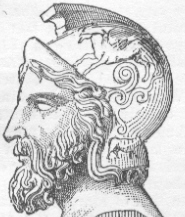<Back to Index>
- General of Athens Miltiades (Μιλτιάδης), 550 B.C.
- General of Athens Callimachus (Καλλίμαχος), 500+ B.C.
PAGE SPONSOR

Miltiades (Greek: Μιλτιάδης; c. 550 BCE – 489 BCE) was the son of one Cimon, a renowned Olympic chariot racer. Miltiades considered himself a member of the Aeacidae, and he was a member of the prominent Philaid clan. He is known mostly for his role in the Battle of Marathon; as well as his rather tragic downfall afterwards. His son Cimon was a major Athenian figure of the 470s and 460s BCE. His daughter Elpinice is remembered for her confrontations with Pericles, as recorded by Plutarch.
Miltiades made himself the tyrant of the Greek colonies on the Thracian Chersonese, forcibly seizing it from his rivals and imprisoning them. His step - uncle Miltiades the Elder, and his brother Stesagoras, had been the ruler before him. When Stesagoras had died, Miltiades was sent to rule the Chersonese, around 482 BCE. His brother's reign had been tumultuous, full of war and revolt. Wishing for a tighter reign than his brother, he feigned mourning for his brother's death. When men of rank from the Chersonese came to console him, he imprisoned them. He then assured his power by taking in 500 troops. He also married Hegesipyle, the daughter of king Olorus of Thrace.
Thracian Chersonese was forced to submit to Persian rule. Miltiades became a vassal of Darius I of Persia, joining Darius' expedition against the Scythians around 513 BCE. Miltiades had suggested destroying the bridge across the Danube which Darius used to cross into Scythia, leaving Darius to die. The others were afraid to do this, and so it never happened, but Darius was aware of Miltiades' scheming; and so his rule in the Chersonese was a perilous affair since this point. He joined the Ionian Revolt of 499 BCE against Persian rule, establishing friendly relations with Athens and capturing the islands of Lemnos and Imbros, which he eventually ceded to Athens, who had ancient claims to these lands. However, the revolt collapsed in 494 BCE and in 492 BCE Miltiades fled to Athens to escape a retaliatory Persian invasion. His son Metiochos was captured by the Persian fleet and made a lifelong prisoner, but was nonetheless treated honorably as a de facto member of the Persian nobility. Arriving in Athens, Miltiades initially faced a hostile reception for his tyrannical rule in the Thracian Chersonese. Having spent three years in prison he was sentenced to death for the crime of tyranny. However, he successfully presented himself as a defender of Greek freedoms against Persian despotism and escaped punishment.
Miltiades is often credited with devising the tactics that defeated the Persians in the Battle of Marathon. Miltiades was elected to serve as one of the ten generals (strategoi) for 490 BCE. In addition to the ten generals, there was one 'war - ruler' (polemarch), Callimachus, who had been left with a decision of great importance. The ten generals were split, five to five, on whether to attack the Persians at Marathon then, or later. Miltiades was firm in insisting on an immediate attack, and convinced this decisive vote of Callimachus for the necessity of a swift attack.
He also convinced the generals of the necessity of not using the customary tactics, as hoplites usually marched in an evenly distributed phalanx of shields and spears, a standard with no other instance of deviation until Epaminondas. Miltiades feared the cavalry of the Persians attacking the flanks, and asked for the flanks to have more hoplites than the center. Miltiades also had his men run, something like a mile, in full armor to resist any swift attack of the Persians. This was very successful in defeating the Persians, who then tried to sail around the Cape Sounion and attack Attica from the west. Miltiades got his men to quickly march to the western side of Attica overnight, causing Datis to flee at the sight of the soldiers who had just defeated him the previous evening.
The following year, 489 BCE, Miltiades led an Athenian expedition of seventy ships against the Greek inhabited islands that were deemed to have supported the Persians. The expedition was not a success. His true motivations were to attack Paros, feeling he had been slighted by them in the past. The fleet attacked the island, which had been conquered by the Persians, but failed to take it. Miltiades suffered a grievous leg wound during the campaign and became incapacitated. His failure prompted an outcry on his return to Athens, enabling his political rivals to exploit his fall from grace. Charged with treason, he was sentenced to death, but the sentence was converted to a fine of fifty talents. He was sent to prison where he died, probably of gangrene from his wound. The debt was paid by his son Cimon. Pheidias later erected a statue in Miltiades' honor of Nemesis, the deity whose job it was to bring sudden misfortune to those who had experienced an excess of fortune, in the temple of the goddess at Rhamnus. The statue was said to be made of marble provided by Datis for a memorial to the Persians' expected victory.
Callimachus (Καλλίμαχος) was polemarch in Athens in 490 BC, and was one of the commanders at the Battle of Marathon. As polemarch, Callimachus had a vote in military affairs along with the 10 strategoi, the generals, such as Miltiades. Miltiades convinced Callimachus to vote in favor of a battle when the strategoi were split evenly on the matter.
At Marathon, Callimachus commanded the right wing of the Athenian army. The right and left wings (the left wing commanded by the Plataeans) surrounded the Persians after a seemingly suicidal charge by the center line. Although the Greeks were victorious, Callimachus was killed during the fighting. His arm was allegedly hacked off by an axe; he presumably died from this injury.